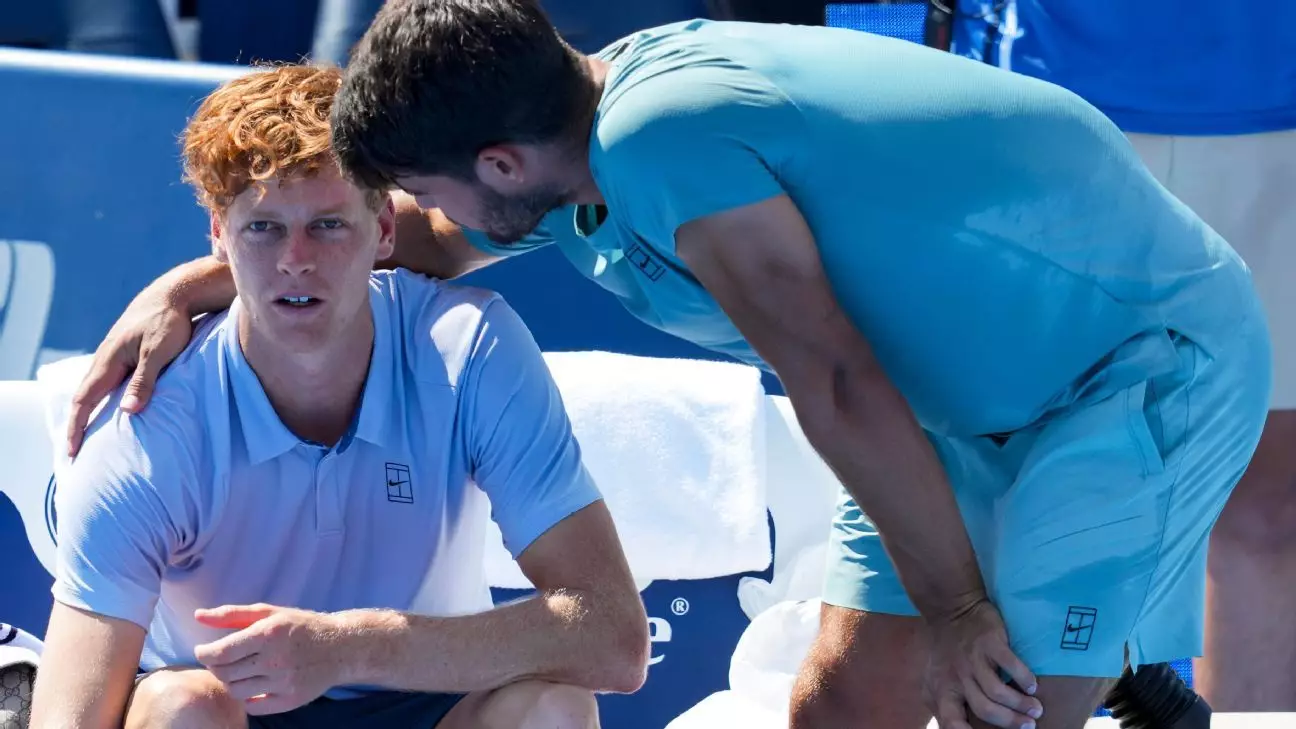In a sport that thrives on grit, endurance, and mental resilience, moments of unforeseen circumstances often redefine expectations and narratives. The Cincinnati Open final, which was poised to be a highly anticipated clash between rising star Carlos Alcaraz and seasoned contender Jannik Sinner, transformed into a moment of reflection on the fragility of athletic achievement. While Alcaraz’s victory was celebrated, the circumstances underscoring it cast a shadow — unconventional and tragic, Sinner’s sudden illness and retirement interrupted what could have been an epic showdown. From the outset, the match underscored how external health factors can abruptly shift the course of sporting milestones, reminding us that victory isn’t solely about skill but also the unpredictability of physical wellness.
The match’s abrupt end exposed the vulnerabilities even the strongest athletes face. Sinner’s struggle was visible early on: discomfort evident, and medical intervention necessary before he could even complete the first set. His withdrawal, after just 22 minutes, reveals how unpredictable health can be, overshadowing the narrative of competition with a sobering reminder that athletes are susceptible to factors beyond mere technique and preparation. This incident raises broader questions about the physical toll of tennis, especially in high-stakes, high-pressure situations where mental strength is tested against physical limitations.
The Power of Resilience and Future Possibilities
Alcaraz’s triumph, while met with joy, also signifies resilience—the kind that defines a worldly champion. His reflection on losing in Cincinnati last year and his fervent desire to lift the trophy reveals his growth, hunger, and unwavering focus. In defeating Sinner, even through a walkover, Alcaraz demonstrated an emotional maturity that transcends mere wins. His acknowledgment of Sinner’s health plight shows sportsmanship at its highest, framing victory within a context of empathy and shared human experience.
This moment also propels Alcaraz into a bigger role — a future leader in tennis’s new generation. His impressive record against Sinner and recent performances hint at a player who is increasingly confident, highly adaptable, and capable of seizing opportunities, even unexpected ones. With his elevated confidence, Alcaraz appears poised for larger victories, especially with the U.S. Open looming on the horizon. His victory consolidates his status not just as a talented player, but as a resilient competitor willing to face unforeseen challenges head-on.
Meanwhile, Sinner’s predicament highlights an urgent need for the sport to prioritize athlete health and recovery. His streak of 12 matches and record on hard courts were building anticipation for a landmark title defense. His illness disrupts that momentum, but it should serve as a wake-up call that the physical demands of tennis require robust health protocols and support systems. Sinner’s situation emphasizes the importance of medical vigilance and athlete welfare — factors that sometimes are overlooked amidst the glamour of victory and defeat.
A Historic Final and Broader Implications for Tennis
The rarity of Cincinnati finals ending in a retirement marks it as a significant anomaly in tennis history. Only twice before has the top-two seeds faltered in the final due to injury or illness, highlighting how rare and unpredictable such outcomes are. This anomaly underscores the importance of adaptability and mental toughness — qualities that define champions not just in winning, but in navigating adversity.
The upcoming U.S. Open now carries an added layer of anticipation. Historically, Cincinnati winners have often gone on to succeed at the Grand Slam, reinforcing the tournament’s role as a crucial step before the major challenge in New York. Whether Alcaraz can leverage this momentum remains to be seen, but his resilience and focus suggest he’s ready for the ultimate test. Conversely, Sinner’s illness serves as a reminder of the human element behind such competitions, urging fans and players alike to respect the unpredictability that makes tennis enthralling.
In the broader context, the incident opens conversations within the tennis community about health management, athlete well-being, and the unpredictable nature of sports at the highest levels. It challenges the narrative that victory is the sole measure of success, emphasizing instead the importance of health, perseverance, and sportsmanship. As the tennis world turns its attention to the upcoming Grand Slam, this event at Cincinnati will linger as a testament to the sport’s unpredictable beauty — where even in victory, humility and human vulnerability prevail.


Leave a Reply